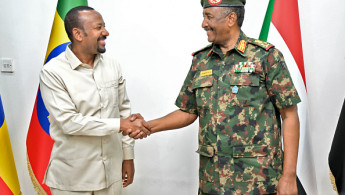Sudan army chief Burhan meets Ethiopia's Ahmed in first high-level state visit since war
Sudan's de facto leader Abdel Fattah al-Burhan, who has led the army in a war against paramilitaries for over a year, on Tuesday hosted Ethiopian prime minister Abiy Ahmed.
Ahmed's visit to the Red Sea coastal town of Port Sudan - currently the seat of the army-aligned government - is the highest-level state visit since the war began between the army and the paramilitary Rapid Support Forces in April 2023.
"It is a testament to the depth of relations" between the two countries, Sudan's ruling Transitional Sovereignty Council said in a statement.
In a closed-door meeting, Burhan briefed Ahmed on the "crimes and atrocities" committed by the RSF as part of the "terrorist militia's rebellion against the state and its institutions," his council said.
According to the Ethiopian premier's office, Tuesday's meeting comes in the context of Ahmed's "commitment to finding sustainable solutions for Sudan's stability".
The visit comes as the African Union, which is headquartered in Addis Ababa, seeks to restart truce talks between Burhan and his former deputy, RSF commander Mohamed Hamdan Daglo.
Burhan's army camp has so far largely shunned East African mediation attempts, accusing regional leaders of siding with "the terrorist militia".
The meeting also comes two days after Egyptian President Abdel Fattah al-Sisi - Ahmed's regional rival - hosted Sudanese civilian and political leaders, including key members of Burhan's government, for talks on ending the war.
Mediation efforts, including by the United States and Saudi Arabia, have repeatedly floundered while the rival generals vie for tactical advantage.
The conflict in the country of 48 million people has so far killed tens of thousands of people, with some estimates placing the death toll as high as 150,000, according to US envoy to Sudan Tom Perriello.
It has also forced nearly 10 million people to flee both internally and across borders, decimated Sudan's already fragile infrastructure and healthcare system and pushed the impoverished country to the brink of famine.




 Follow the Middle East's top stories in English at The New Arab on Google News
Follow the Middle East's top stories in English at The New Arab on Google News

![A group of Palestinians, foreign and Israeli activists gather to participated in an olive picking event on the land in the town of Battir, which is under threat of confiscation by Israel in Bethlehem, occupied West Bank on 8 November 2024. [Getty]](/sites/default/files/styles/image_330x185/public/2182930803.jpeg?h=199d8c1f&itok=__0LgGsa)
